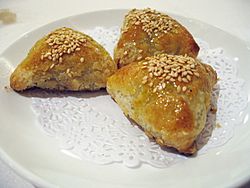Chinese flaky pastry facts for kids

|
|
| Alternative names | Chinese puff pastry |
|---|---|
| Type | Pastry |
| Place of origin | China |
| Main ingredients | Flour, shortening (traditionally lard |
| Variations | Huaiyang-style Cantonese-style |
| Similar dishes | Flaky pastry |
Chinese flaky pastry is a special type of pastry from China. It's also known as Chinese puff pastry. This pastry is unleavened, meaning it doesn't use yeast or baking powder to make it rise. Instead, it gets its light, flaky layers from how it's made.
This pastry is used in many traditional Chinese treats. These treats are often called soubing (or soubeng in some areas). There are two main kinds of Chinese flaky pastry. One is called Huaiyang-style pastry. The other is Cantonese-style pastry. Huaiyang-style pastry is used for yummy snacks like Shanghainese 'crab shell' pastries. Cantonese-style pastry is used for treats like sweetheart cakes.
How Is It Made?
Making Chinese flaky pastry is a bit like magic! It needs two different kinds of dough. One is called the 'water' dough. The other is the 'oil' dough.
The Doughs
The 'water' dough is made by mixing flour, oil (or fat), and warm water. Imagine mixing 10 parts flour with 3 parts oil and 4 parts warm water. This dough is soft and easy to work with.
The 'oil' dough is simpler. It's made by mixing flour directly with oil or fat. You might use 2 parts flour to 1 part oil, or 3 parts flour to 1 part oil. This dough is special because it makes the pastry crumbly and rich when you eat it.
Layering the Pastry
Once both doughs are ready, the real fun begins! The two doughs are carefully folded and rolled out many times. This creates lots of very thin layers. These layers are called laminated layers. Think of it like stacking many thin sheets of paper on top of each other.
After the layers are made, the pastry is filled with different yummy ingredients. Then, it's baked in an oven. The temperature is usually between 180 and 220 degrees Celsius (about 350 to 430 degrees Fahrenheit). When it bakes, the layers separate, making the pastry super flaky and delicious!
 | James Van Der Zee |
 | Alma Thomas |
 | Ellis Wilson |
 | Margaret Taylor-Burroughs |

